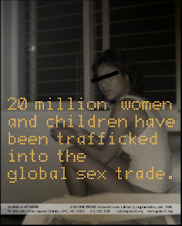The economy of the sex trade works through a series of relationships that are based on othering or devaluing certain individuals. In this case, the sex workers are considered as lesser. They are usually subordinated by institutions of either race or class (or both) that allow their oppressors to easily identify and exploit them (Roland, 152). Those who utilize the services of sex workers are often of a different race and a higher class than the workers themselves. Those who benefit most from sex work are those who are stealing the profits from the workers: the pimps or mistresses who control the workers or the brothels.
This economy is often based on modern day slavery. The sex tourism industry is comprised of three main types of slavery:
- Human trafficking
- Contract systems
- Debt bondage
Human trafficking involves the capture, sale or trickery involved in moving a person from one area to another for the purposes of exploitation (FitzGibbon, 82). Women and children are frequently trafficked into the sex trade. Sometimes they are promised a well-paying job in a new location, but then are forced into sex work upon their arrival. Other times their families sell them into slavery, or they are captured and held as sex slaves. Mail order brides sometimes, but not always, fall into the category of trafficked sex slaves.
Many sex workers are also held in slavery through contract systems. They have a contract with their pimp or mistress that details how many customers they will have to serve, and what amenities or protections they will receive in return (FitzGibbon, 85).
Debt bondage in this circumstance includes the use of sex work to pay off a debt (Bales, 4). Sex workers must earn a certain amount of money through their work to pay off their debt, or they must engage in sexual acts with whomever they are indebted to in order to clear their debt. Debt bondage is a particularly difficult cycle to break because when a person is released from bondage they often do not have any skills or resources to support themselves and are forced to acquire new debt.
It is important to note that of course not all sex workers are in a position of slavery. Sex workers engage in sex work for a variety of reasons and slavery is just one of the possible reasons.
Click HERE to open the feedback tool.
Works Cited
Bales, Kevin. Understanding Global Slavery: A Reader. Berkeley: University of California Press, 2005.
FitzGibbon, Kathleen. “Modern Day Slavery? The Scope of Trafficking in Persons in Africa.” African Security Review 12.1 (2003). 81-89.
Roland, L. Kaifa. “Tourism and the Negrificacion of Cuban Identity.” Transforming Anthropology 14.2 (2006). 151-162.








